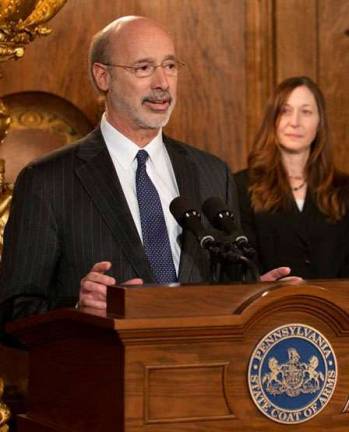Wolf seeks billions in higher taxes for schools, tax revamp

By MARC LEVY and PETER JACKSON
HARRISBURG (AP) — In an ambitious first budget plan, Gov. Tom Wolf on Tuesday proposed more than $4 billion in higher state taxes on income, sales and natural gas drilling to support new spending on schools and to cut property taxes as part of an overhaul of the way public education is funded.
Wolf, a Democrat, is also asking the Republican-controlled Legislature to cut corporate taxes by hundreds of millions of dollars, borrow more than $4 billion to refinance pension debt and inject new money into business loans, clean energy subsidies and water and sewer system projects.
All told, new subsidies for education from prekindergarten through college plus money for districts to reduce school property taxes would amount to more than $4 billion.
Saddled with nearly $4 billion in projected deficits and rising costs in the budget year that starts July 1, Wolf also said his plans would put the state on sound financial footing after three credit downgrades last year.
Top Democrats applauded the plan. But leaders of the Legislature's huge Republican majorities quickly singled out the nearly $5 billion in increased state spending as a serious point of disagreement.
They said they may eventually find common ground on cutting pension costs and corporate and school property taxes.
In a 33-minute speech to lawmakers, Wolf said his budget would make the tax system fairer, improve public schools hit hard by recent cutbacks in state aid and foster a more vigorous business environment that produces more good-paying jobs. The total tax burden on average middle-class homeowners would drop by 13 percent under his plan, Wolf said.
“It includes Democratic ideas, Republican ideas and clearly ideas that exist beyond party lines," Wolf told a joint session of the Legislature. “It is rooted in the values of fairness, inclusion and common sense. It is a balanced budget, and it eliminates our $2.3 billion deficit. But above all, it recognizes that Pennsylvania will not improve until we rebuild the middle class."
Pennsylvania, Wolf said, stands at a crossroads, with an education crisis and bottom-of-the-nation rankings in job growth and creditworthiness. That is not acceptable, he said.
“The reality is, times have changed, and ideas that may have worked in the past simply aren't working anymore," Wolf said. “Our budget should be as bold and ambitious as Pennsylvania has been over the past 300 years. Today, I laid out my plan, and I'm going to fight for it."
If passed, it would represent the biggest revamp in state taxation in decades, but many elements are sure to run into Republican opposition. For instance, Senate President Pro Tempore Joe Scarnati, R-Jefferson, said Wolf's proposal for an income tax increase will not get consideration in the chamber as part of what he called a two-year, $12 billion tax increase.
“I don't think Pennsylvanians voted for that," Scarnati said. “His proposals are so largesse in tax and spend, that it's very difficult even to, with a straight face, sit down at a negotiating table."
All told, Wolf's spending plan would increase overall state spending through the state's main bank account by about 3 percent to $29.9 billion from the current year's approved budget. Counting $1.75 billion in pension obligation payments and $2.1 billion in school property tax relief, the increase is about 16 percent to $33.7 billion.
House Majority Leader Dave Reed, R-Indiana, called the size of the proposed spending increase “historic."
“I think a 16 percent growth rate in spending is certainly not something that's going to be acceptable," Reed said. “Not only to the General Assembly, but to the people of Pennsylvania."
The centerpiece of Wolf's plan is a $3.8 billion property-tax initiative, including $600 million in casino gambling revenue, that he said would mean an average reduction of more than 50 percent in homeowner and farmstead property taxes in the 2016-17 school year. Another $426 million would go toward new rebates for renters with incomes up to $50,000.
Communities with higher tax and poverty rates would receive proportionately more relief.
It would help correct a system in which the state contributes a smaller portion of school costs than Alabama, Mississippi or West Virginia, punishing lower-income homeowners and fixed-income seniors with a high burden of property taxes.
“That means poorer urban and rural districts are not getting the help they need," Wolf told lawmakers. “The gap in spending between rich districts and poor districts has, as a result, exploded."
For education, Wolf is seeking nearly $1 billion in increases, from pre-kindergarten programs to universities, after deep cuts sustained during the prior administration. Another nearly $700 million would to go the Department of Human Services, which administers health care and social services programs.
The biggest increase in tax revenues would come from a proposed hike in the personal income tax — the first in 11 years — to generate $2.3 billion next year.
The flat tax would increase from 3 7 percent to 3.7 percent and would be expanded to cover lottery winnings. The special poverty provision would be increased to allow more households to pay no income tax.
Wolf's proposed increase in the sales tax would be the first in nearly 50 years, lifting the rate from 6 percent to 6.6 percent — and 7 percent to 7.6 percent in Allegheny County — while eliminating dozens of exemptions from the tax.
He would also increase taxes on natural gas drilling, banks and cigarettes and other tobacco products. The per-pack tax on cigarettes would rise by a dollar to $2.60 per pack.